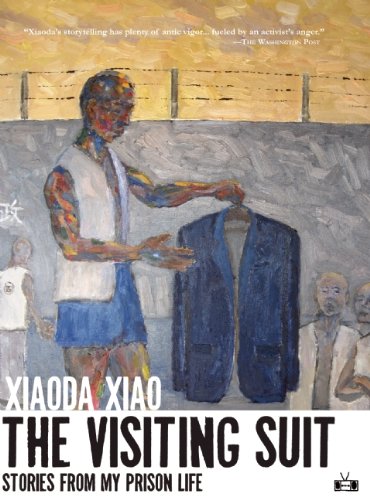
.
 When he was a 20-year-old college student, Xiaoda Xiao (The Cave Man) was declared a counter-revolutionary for ripping a poster of Chairman Mao. Without a trial, he was sent to a prison on an island in Taihu Lake, where he labored in a stone quarry for seven years.
When he was a 20-year-old college student, Xiaoda Xiao (The Cave Man) was declared a counter-revolutionary for ripping a poster of Chairman Mao. Without a trial, he was sent to a prison on an island in Taihu Lake, where he labored in a stone quarry for seven years.
From the opening scene, where children throw trash on the arrested people in the central square, The Visiting Suit depicts a China locked into a passionate conformism, where speaking out is horrifically punished. Quietly, without sensationalism, Xiao depicts a brutal world where walking hand-in-hand with a woman prisoner or stealing a couple of watermelons can bring brutal repercussions, where an inmate can be executed for what he shouts out in his dreams.
Abused and mistreated by both the guards and the other prisoners, forced to endure self-condemnation in nightly thought-reform courses, Xiao labors daily, dynamiting rock in a quarry where there are monthly fatalities, and sleeps in a barracks where there are silent battles to the death in the lavatory at night. The prisoners around him come to life in quick sketches: the former veterinarian driven to castrate himself; the director of an opera company turned in by his own wife; the handsome former propagandist volunteering for a gastrectomy he doesn't need; the crippled doorkeeper who decides to commit suicide with the woman he loves. We meet the new No. 55, replacing the No. 55 killed in the quarry. He's a fallen officer once higher than the highest authority there in the prison, a proud, furious man who won't speak a word, refusing to accept that he is a prisoner now, with a number instead of a name.
Xiao endures the horrors of solitary confinement and slowly becomes one of the quarry's top workers; seven years later, he walks out of prison--on the day the radios announce the death of Chairman Mao.
According to his publisher, Xiao's books arrive in English, self-translated in the author's passionate attempt to make his work known outside of China. Allowing for a few slips (heroin for heroine, steel for steal) and juggling over 100 character names, these stark, unadorned stories have a simple immediacy, composed with natural, everyday language for only one purpose: to tell you exactly what it was like.--Nick DiMartino

